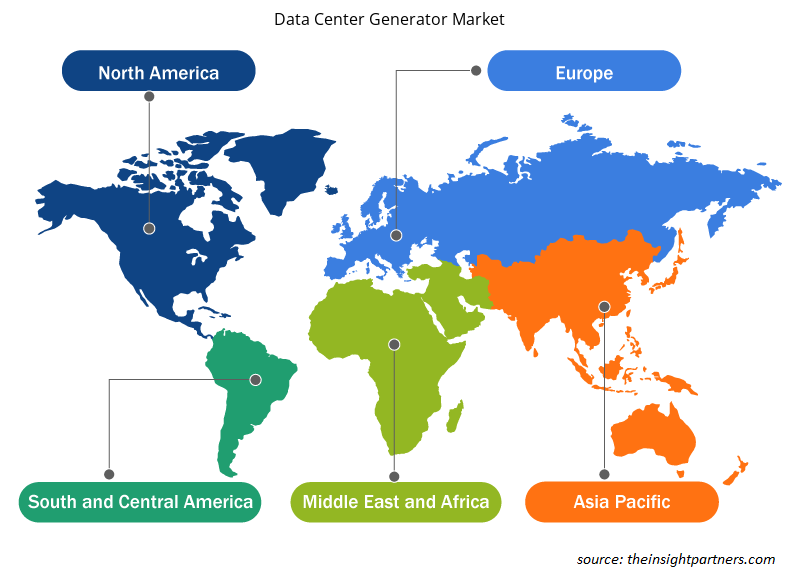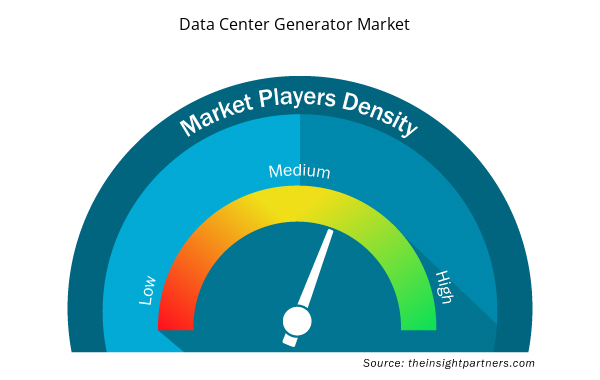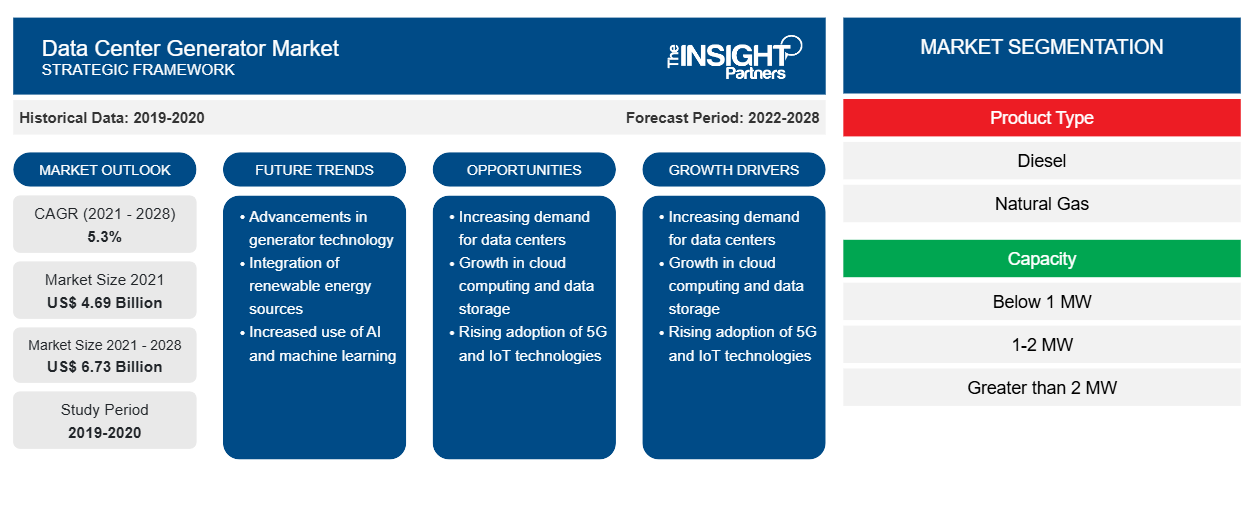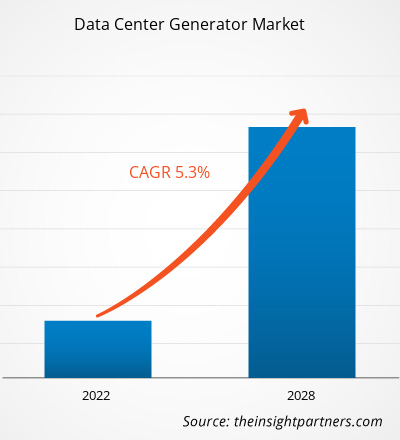[研究报告] 2021 年数据中心发电机市场价值为 46.93 亿美元,预计到 2028 年将达到 67.2953 亿美元;预计 2021 年至 2028 年的复合年增长率为 5.3%。
发电机在停电期间充当数据中心的备用电源库。数据中心全面停电可能需要重新启动系统,从而导致系统停机、启动困难和数据丢失。因此,数据中心始终由发电机提供的备用电源提供支持,以避免此类异常和故障。这些好处正在推动数据中心发电机市场的增长。
这些发电机不需要现有的电源即可运行,这是市场的重要驱动因素。此外,知名制造商还根据不断变化的客户需求制造具有定制容量的发电机。此类系统可以根据数据中心的电力需求进行扩大和缩小。这种适应性可能会增加对数据中心发电机的需求,从而促进市场增长。由于全球对边缘数据中心的需求增加,几家云服务提供商增加了产量。例如,谷歌在 2019 年斥资 33 亿美元扩大其在欧洲的数据中心业务。此外,市场可能会受益于超大规模设施的不断发展以及柴油旋转不间断电源 (DRUPS) 实施的增加。
定制此报告以满足您的需求
您可以免费定制任何报告,包括本报告的部分内容、国家级分析、Excel 数据包,以及为初创企业和大学提供优惠和折扣
- 获取此报告的关键市场趋势。这个免费样品将包括数据分析,从市场趋势到估计和预测。
数据中心发电机市场洞察
数据中心数量的增加
在这个数据时代,互联网连接设备的数量已经达到约 70 亿,而且这一数字还在不断增长。其中许多设备会产生大量数据,这些数据必须被记录、路由、存储、评估和检索。随着物联网 (IoT) 和工业 4.0的兴起,制造商依靠大数据和数据分析来提高其运营的效率、生产力、安全性和成本效益。另一方面,内部数据管理变得越来越复杂、耗时且成本高昂。为了节省能源和基础设施成本,即使是思科这样的大公司也会考虑关闭部分内部数据中心。
联网设备普及率的提高、互联网的便捷访问,再加上互联网服务成本的降低,推动了全球对数据存储的需求。由于对大数据分析和基于云的服务(如由电影、应用程序、视频和社交媒体组成的在线内容)的需求不断增长,对数据存储的需求也在激增。因此,基于云的公司在其数据中心部署 IT 空间。多个行业正在探索云产品,并发现数据中心服务的好处,以支持与云相关的需求。这些发展直接影响了物联网 (IoT) 使用的增长,从而导致世界各地大量数据中心的建设。例如,Colt 宣布在欧洲和亚太地区开发其超大规模数据中心,此前该公司已在欧洲出售了 12 个边缘主机托管中心。该公司已在伦敦、法兰克福、巴黎和日本未公开的地点购买了 10 块新地块,这将使其能够创造大约 100 兆瓦的 IT 电力。因此,数据中心数量的增加增加了对数据中心发电机获得充足电力供应的需求,从而推动了数据中心发电机市场的增长。
基于产品类型的市场洞察
近年来,全球对数据中心发电机的需求不断增长。各公司提供三种类型的数据中心发电机——柴油、天然气和双燃料。2022 年 1 月,康明斯发电公司宣布其电力解决方案荣获中国数据中心行业大奖。该公司生产柴油数据中心发电机。2021 年 1 月,TRG 数据中心宣布升级其德克萨斯州数据中心。该公司计划安装双燃料选项以用于备用电源
基于产能的市场洞察
就容量而言,数据中心发电机市场规模分为 1 MW 以下、1-2 MW 和 2 MW 以上。1 MW 以下是数据中心发电机中最突出的容量。容量超过 10 MW 的设施采用 2 MW 以上的发电机。模块化数据中心部署通常采用容量低于 1 MW 的发电机。采用容量低于 1 MW 的发电机预计将增加数据中心的部署。由于成本较低,发展中经济体的小型数据中心运营商正在采用它们。新兴经济体超大规模设施制造业的兴起将在未来几年减少对低容量发电机的依赖。
数据中心发电机市场参与者采用合并、收购和市场计划等策略来保持其在市场中的地位。以下列出了主要数据中心发电机市场参与者的一些发展:
- ABB 有限公司推出了新的轴带发电机技术。这种新型发电机为许多船舶(包括散货船和集装箱船)带来了灵活性和安装便利性。AMZ 1400 永磁轴带发电机针对变流器控制进行了优化,效率高于感应发电机。
- 卡特彼勒将启动利用氢燃料电池技术为微软数据中心提供备用电源的示范项目。该项目使卡特彼勒能够与行业领导者合作,向商业上可行的电源解决方案迈出一大步,同时支持客户使其运营更加可持续。
数据中心发电机市场区域洞察
Insight Partners 的分析师已详细解释了预测期内影响数据中心发电机市场的区域趋势和因素。本节还讨论了北美、欧洲、亚太地区、中东和非洲以及南美和中美洲的数据中心发电机市场细分和地理位置。

- 获取数据中心发电机市场的区域特定数据
数据中心发电机市场报告范围
| 报告属性 | 细节 |
|---|---|
| 2021 年市场规模 | 46.9亿美元 |
| 2028 年市场规模 | 67.3亿美元 |
| 全球复合年增长率(2021 - 2028) | 5.3% |
| 史料 | 2019-2020 |
| 预测期 | 2022-2028 |
| 涵盖的领域 | 按产品类型
|
| 覆盖地区和国家 | 北美
|
| 市场领导者和主要公司简介 |
|
数据中心发电机市场参与者密度:了解其对业务动态的影响
数据中心发电机市场正在快速增长,这得益于终端用户需求的不断增长,而这些需求又源于消费者偏好的不断变化、技术进步以及对产品优势的认识不断提高等因素。随着需求的增加,企业正在扩大其产品范围,进行创新以满足消费者的需求,并利用新兴趋势,从而进一步推动市场增长。
市场参与者密度是指在特定市场或行业内运营的企业或公司的分布情况。它表明在给定市场空间中,相对于其规模或总市场价值,有多少竞争对手(市场参与者)存在。
在数据中心发电机市场运营的主要公司有:
- ABB
- 阿特拉斯·科普柯公司
- 毛虫
- 康明斯公司
- 道依茨汽车公司
免责声明:上面列出的公司没有按照任何特定顺序排列。

- 获取数据中心发电机市场顶级关键参与者概览
全球数据中心发电机市场根据产品类型、容量和等级进行细分。根据产品类型,数据中心发电机市场分为柴油、天然气和其他类型。就容量而言,数据中心发电机市场分为小于 1 MW、1-2 MW 和大于 2 MW。此外,根据等级,数据中心发电机市场分为 1 级和 2 级、3 级和 4 级。
ABB、Atlas Copco AB、Caterpillar、Cummins Inc.、DEUTZ AG、Generac Power Systems, Inc.、HITEC Power Protection、Kirloskar、Kohler Co. 和三菱汽车公司是本次研究考虑的主要数据中心发电机市场参与者。此外,本研究报告还研究和分析了其他几家重要的数据中心发电机市场参与者,以全面了解全球数据中心发电机市场规模及其生态系统。
- 历史分析(2 年)、基准年、预测(7 年)及复合年增长率
- PEST 和 SWOT 分析
- 市场规模价值/数量 - 全球、区域、国家
- 行业和竞争格局
- Excel 数据集


- Medical Enzyme Technology Market
- Artificial Intelligence in Healthcare Diagnosis Market
- Excimer & Femtosecond Ophthalmic Lasers Market
- Influenza Vaccines Market
- Sterilization Services Market
- Tortilla Market
- Joint Pain Injection Market
- 3D Mapping and Modelling Market
- Saudi Arabia Drywall Panels Market
- Health Economics and Outcome Research (HEOR) Services Market

Report Coverage
Revenue forecast, Company Analysis, Industry landscape, Growth factors, and Trends

Segment Covered
This text is related
to segments covered.

Regional Scope
North America, Europe, Asia Pacific, Middle East & Africa, South & Central America

Country Scope
This text is related
to country scope.
常见问题
The rising inclination towards renewables are environmental sustainability and energy savings is positively impacting the data center generator market. When rising and unpredictable energy costs and levies linked with pending carbon emission regulations are considered, it is easy to see why operators are becoming more interested in renewables' role in lowering and stabilizing energy costs. Google's hyper-scale data centers have been pioneers in renewable energy programs, researching their inherent financial, environmental, and social value. Google chooses locations for its data centers based on various considerations, including the availability of reliable service and the opportunity for renewable energy. Thus, these initiatives are further expected to contribute to the growth of the data center generator market over the forecast period.
The diesel segment led the data center generator market with a market share of 69.7% in 2020. It is expected to account for 68.7% of the total market in 2028.
Most data centers maintain enough fuel on hand to run the generator for 24-48 hours. To preserve sensitive data, data centers require dependable backup power. Thus, the global data center generator market is primarily driven by the increase in number of data centers and in backup power supply requirements in data centers.
North America dominated the data center generator market in 2020 with a share of 37.25%; it would continue to dominate the market during the forecast period and account for 31.67% share by 2028. Europe is the second-largest contributor to the global data center generator market, followed by Asia Pacific.
ABB; Atlas Copco AB; Caterpillar; Cummins Inc.; DEUTZ AG; Generac Power Systems, Inc.; HITEC Power Protection; Kirloskar; Kohler Co.; and MITSUBISHI MOTORS CORPORATION.
The less than 1MW segment led the data center generator market with a market share of 44.4% in 2020. It is expected to account for 46.1% of the total market in 2028.
Trends and growth analysis reports related to Energy and Power : READ MORE..
The List of Companies - Data Center Generator Market
- ABB
- Atlas Copco AB
- Caterpillar
- Cummins Inc.
- DEUTZ AG
- Generac Power Systems, Inc.
- HITEC Power Protection
- Kirloskar
- Kohler Co.
- MITSUBISHI MOTORS CORPORATION
The Insight Partners performs research in 4 major stages: Data Collection & Secondary Research, Primary Research, Data Analysis and Data Triangulation & Final Review.
- Data Collection and Secondary Research:
As a market research and consulting firm operating from a decade, we have published and advised several client across the globe. First step for any study will start with an assessment of currently available data and insights from existing reports. Further, historical and current market information is collected from Investor Presentations, Annual Reports, SEC Filings, etc., and other information related to company’s performance and market positioning are gathered from Paid Databases (Factiva, Hoovers, and Reuters) and various other publications available in public domain.
Several associations trade associates, technical forums, institutes, societies and organization are accessed to gain technical as well as market related insights through their publications such as research papers, blogs and press releases related to the studies are referred to get cues about the market. Further, white papers, journals, magazines, and other news articles published in last 3 years are scrutinized and analyzed to understand the current market trends.
- Primary Research:
The primarily interview analysis comprise of data obtained from industry participants interview and answers to survey questions gathered by in-house primary team.
For primary research, interviews are conducted with industry experts/CEOs/Marketing Managers/VPs/Subject Matter Experts from both demand and supply side to get a 360-degree view of the market. The primary team conducts several interviews based on the complexity of the markets to understand the various market trends and dynamics which makes research more credible and precise.
A typical research interview fulfils the following functions:
- Provides first-hand information on the market size, market trends, growth trends, competitive landscape, and outlook
- Validates and strengthens in-house secondary research findings
- Develops the analysis team’s expertise and market understanding
Primary research involves email interactions and telephone interviews for each market, category, segment, and sub-segment across geographies. The participants who typically take part in such a process include, but are not limited to:
- Industry participants: VPs, business development managers, market intelligence managers and national sales managers
- Outside experts: Valuation experts, research analysts and key opinion leaders specializing in the electronics and semiconductor industry.
Below is the breakup of our primary respondents by company, designation, and region:

Once we receive the confirmation from primary research sources or primary respondents, we finalize the base year market estimation and forecast the data as per the macroeconomic and microeconomic factors assessed during data collection.
- Data Analysis:
Once data is validated through both secondary as well as primary respondents, we finalize the market estimations by hypothesis formulation and factor analysis at regional and country level.
- Macro-Economic Factor Analysis:
We analyse macroeconomic indicators such the gross domestic product (GDP), increase in the demand for goods and services across industries, technological advancement, regional economic growth, governmental policies, the influence of COVID-19, PEST analysis, and other aspects. This analysis aids in setting benchmarks for various nations/regions and approximating market splits. Additionally, the general trend of the aforementioned components aid in determining the market's development possibilities.
- Country Level Data:
Various factors that are especially aligned to the country are taken into account to determine the market size for a certain area and country, including the presence of vendors, such as headquarters and offices, the country's GDP, demand patterns, and industry growth. To comprehend the market dynamics for the nation, a number of growth variables, inhibitors, application areas, and current market trends are researched. The aforementioned elements aid in determining the country's overall market's growth potential.
- Company Profile:
The “Table of Contents” is formulated by listing and analyzing more than 25 - 30 companies operating in the market ecosystem across geographies. However, we profile only 10 companies as a standard practice in our syndicate reports. These 10 companies comprise leading, emerging, and regional players. Nonetheless, our analysis is not restricted to the 10 listed companies, we also analyze other companies present in the market to develop a holistic view and understand the prevailing trends. The “Company Profiles” section in the report covers key facts, business description, products & services, financial information, SWOT analysis, and key developments. The financial information presented is extracted from the annual reports and official documents of the publicly listed companies. Upon collecting the information for the sections of respective companies, we verify them via various primary sources and then compile the data in respective company profiles. The company level information helps us in deriving the base number as well as in forecasting the market size.
- Developing Base Number:
Aggregation of sales statistics (2020-2022) and macro-economic factor, and other secondary and primary research insights are utilized to arrive at base number and related market shares for 2022. The data gaps are identified in this step and relevant market data is analyzed, collected from paid primary interviews or databases. On finalizing the base year market size, forecasts are developed on the basis of macro-economic, industry and market growth factors and company level analysis.
- Data Triangulation and Final Review:
The market findings and base year market size calculations are validated from supply as well as demand side. Demand side validations are based on macro-economic factor analysis and benchmarks for respective regions and countries. In case of supply side validations, revenues of major companies are estimated (in case not available) based on industry benchmark, approximate number of employees, product portfolio, and primary interviews revenues are gathered. Further revenue from target product/service segment is assessed to avoid overshooting of market statistics. In case of heavy deviations between supply and demand side values, all thes steps are repeated to achieve synchronization.
We follow an iterative model, wherein we share our research findings with Subject Matter Experts (SME’s) and Key Opinion Leaders (KOLs) until consensus view of the market is not formulated – this model negates any drastic deviation in the opinions of experts. Only validated and universally acceptable research findings are quoted in our reports.
We have important check points that we use to validate our research findings – which we call – data triangulation, where we validate the information, we generate from secondary sources with primary interviews and then we re-validate with our internal data bases and Subject matter experts. This comprehensive model enables us to deliver high quality, reliable data in shortest possible time.


 获取此报告的免费样本
获取此报告的免费样本